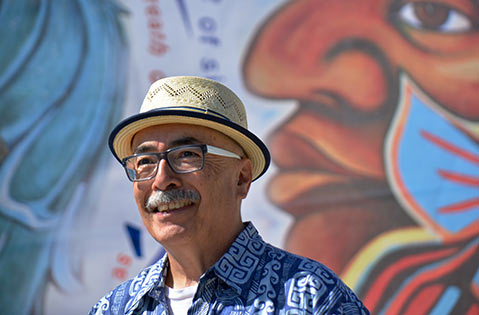U.S. Poet Laureate Comes to UCSB
Juan Felipe Herrera Presents an Evening of Poetry

The first Latino to serve as United States Poet Laureate, Juan Felipe Herrera has published energetic, immediate, eloquent work that has been compared to that of Walt Whitman, César Vallejo, and Allen Ginsberg. As Jennifer Benka, executive director of the Academy of American Poets, notes, he is “someone who believes that poetry can make a difference in people’s lives and communities.” I recently spoke over the phone with Herrera, who will present an evening of poetry Monday, February 1, at UCSB.
You went from serving as Poet Laureate of California directly into the position of Poet Laureate of the United States. What have those two very public positions taught you about the state of poetry in California and across the country? Everyone is hungry for poetry, and everyone delights in it — from high school poetry clubs to support organizations, children who read tons of books, and, of course, spoken word. We do need more bilingual poetries and events, as well, which are on the rise. And the poetry festivals are making progress in their diversity outreach. At the same time, we are losing great writers like Phil Levine, C.D. Wright, and Francisco X. Alarcón.
Would you say the emphasis of poetry is shifting? One of the shifts is toward poetry zines such as Paperbag in the old Tin Pan Alley of N.Y.C. They’re run by young ruffian MFA grads — Adam Soldofsky is one great example. We need to make the existence of these new trends more public. People respond to the call of poetry with urgent excitement.
In your opinion, who stands to benefit the most from poetry, and why? Everyone. Poetry allows reflection in a time of national and global danger, great class divides, ongoing violence in the streets, and loss and anxiety in the working-class schools as well as in privileged arenas. Poetry is the new rock ’n’ roll of the mind and voice — the last frontier.
You excel both on the page and in performance — that’s a rare gift. Can you talk a bit about the bridges and divides between oral and written poetry? The divides are always in flux; there is a swing toward oral text — a blur, as well. For the youth it provides a unique cultural club, which is their power territory — say what you want the way you want it, pierce the walls of proprietary and call out the agents of oppression and youth-hurt. Yet the spoken is also experimental and is becoming a most attractive and alluring art of diverse mediums.
“Youth-hurt” is a striking, if distressing, phrase. I know you’ve worked extensively with at-risk young people. How are they using poetry to eliminate, or at least deal with, their pain? Youth are quite simply writing about their personal lives — in concert with their friends, in groups, and large, young, and new audiences. And they compete, move their bodies onstage, and they become alarmingly sincere about themselves, others, and the various multi-hurts of their streets, peers, cities, and the larger issues of race, color, ethnicity, stereotypes, war, and violence in the larger quest for peace, both outside and inside. These are most effective steps in the healing of self and others.
As someone who has inspired so many people, is there anyone in particular who has inspired you? Francisco X. Alarcón, the great Chicano poet I mentioned earlier, passed away on the 15th of this month to stomach cancer. He was a marvelous poet, pioneer of a new Nahuatl, Aztec poetics, a pioneering teacher, translator, and community leader. We miss him greatly in our communities. I plan to bring his story to light in a number of ways — he was too beautiful and rare and innovative to forget.
4·1·1
UCSB’s Arts & Lectures presents an evening of poetry with Juan Felipe Herrera Monday, February 1, at 7:30 p.m. at UCSB’s Campbell Hall. The event is free. Call (805) 893-3535 or see artsandlectures.ucsb.edu.



